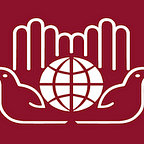H.E. Mary Robinson Delivers Inaugural Ireland at Fordham Humanitarian Lecture
Over 200 humanitarians, academics, UN delegates, and students alike came together on April 29th in the Sputnik Lounge at the United Nation’s Headquarters in New York City for the inaugural lecture of the Ireland at Fordham Humanitarian Lecture Series.
The series, a partnership between The Permanent Mission of Ireland to the United Nations and the Institute of International Humanitarian Affairs (IIHA), Fordham University, began with the inaugural lecture by H.E. Mary Robinson, first elected woman President of Ireland (1990–1997), former UN High Commissioner for Human Rights, and current Chair of The Elders.
Ambassador Geraldine Byrne Nason welcomed the audience by addressing the importance of the Ireland at Fordham Humanitarian Lecture Series:
“We decided that we would work with Fordham on this lecture series because we’re concerned that the nature of humanitarian need itself is changing, indeed, what we understand as humanitarian need is changing. We see conflict as a key driver, we see climate as a key driver, displacement as a key driver… we’re hoping that the Ireland at Fordham Humanitarian Lecture Series will bring a new perspective, we like to think maybe some of that may be an Irish perspective, to exploring the challenges [of humanitarian need], how they affect us, how they affect policy makers, but importantly, how they affect the people who deliver humanitarian need on the ground.”
Brendan Cahill, Executive Director of The Institute of International Humanitarian Affairs, followed the Ambassador’s welcome by expressing the importance of Mrs. Robinson’s timely lecture on the challenge climate change poses to humanitarian action in the twenty-first century:
“Climate justice is a movement which must seek to minimize the power differential that exists between those with resources and those without. In doing so, this also requires a recognition and a reckoning with the status of women in our society. A truly effective Climate Justice movement will be one that shares power equally between gender, race, religion, and sexuality. There is no alternative but for all communities in the world to bind together to answer the call for Climate Justice. The Irish Government and the Institute of International Humanitarian Affairs share a deep bond and a profound commitment to these same values upheld and promoted within the Climate Justice framework.”
As a passionate, forceful advocate for gender equality, women’s participation in peace-building and human dignity, Mrs. Robinson introduced herself by announcing, “I have to warn you. I am an angry granny for Climate Justice!”
Throughout the lecture, she discussed the current impact the humanitarian world faces when responding to crises due to the development and acceleration of climate change over the years:
“Climate change is not just an issue of atmospheric science or plant conservation; it is fundamentally about human rights and the protection of people. When we think about the Universal Declaration of Human Rights and the core principles it promotes, it’s abundantly clear that the impacts of climate change are rapidly undermining the full enjoyment and full range of human rights. It is quite often the most vulnerable who are facing loss of their right to life, to food, to safe water, to shelter and to health.”
Mrs. Robinson concluded the lecture with a personal anecdote:
“If we all fail to act now; if we fail to act decisively; if we fail to act together, future generations will never forgive us for the world that we bequeath them. I think a lot about that world. I have six grandchildren; the eldest is 15. They’ll be in their 20s and their 30s and 40s in 2050. They’ll share the world with nine billion people, and I think a lot about that world and what they will think of us if we don’t use the window that we have.
The full evening lecture is available for viewing here
Photo Credits to Bruce Gilbert
About the Permanent Mission of Ireland to the United Nations
The role of the Permanent Mission of Ireland to the United Nations is to promote Ireland’s foreign policy interests and values at the United Nations.
About the IIHA
The Institute of International Humanitarian Affairs (IIHA) prepares current and future aid workers with the knowledge and skills needed to respond effectively in times of humanitarian crisis and disaster. Our courses are borne of an interdisciplinary curriculum that combines academic theory with the practical experience of seasoned humanitarian professionals. The IIHA also publishes on a wide range of humanitarian topics and regularly hosts a number of events in the New York area, including the annual Humanitarian Blockchain Summit and Design for Humanity Summit.
About Fordham University
Fordham University, the Jesuit University of New York, is committed to the discovery of Wisdom and the transmission of Learning, through research and through undergraduate, graduate and professional education of the highest quality. Guided by its Catholic and Jesuit traditions, Fordham fosters the intellectual, moral, and religious development of its students and prepares them for leadership in a global society.
